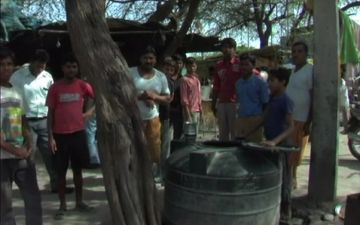The majority of India's water sources are polluted. A lack of access to safe water contributes to a fifth of its communicable diseases. Each day in the booming, nuclear-armed nation, diarrhea alone kills more than 1,600 people.
The regional scenario is even more grim given the projected impact of population pressures and global warming—which aggravates the flood and drought cycle of the monsoon, and the melting of Himalayan glaciers that serve as a natural water reservoir used by a billion people. Northern India may run out of groundwater within a decade, leading to a collapse of agriculture in regions like Punjab, the country's "breadbasket." Pakistan is already on the brink of water scarcity. Meanwhile, a rash of environmentally questionable dam building along the nuclear rivals' shared rivers is further stoking geopolitical tension.
From India to Bangladesh and Nepal, this project will explore the role of local innovators and international actors in aggravating or alleviating the region's water crisis. The reporting will take them from the slums of Delhi to parched rural deserts, and from monsoon-ravaged Bangladesh to the Himalayas.


